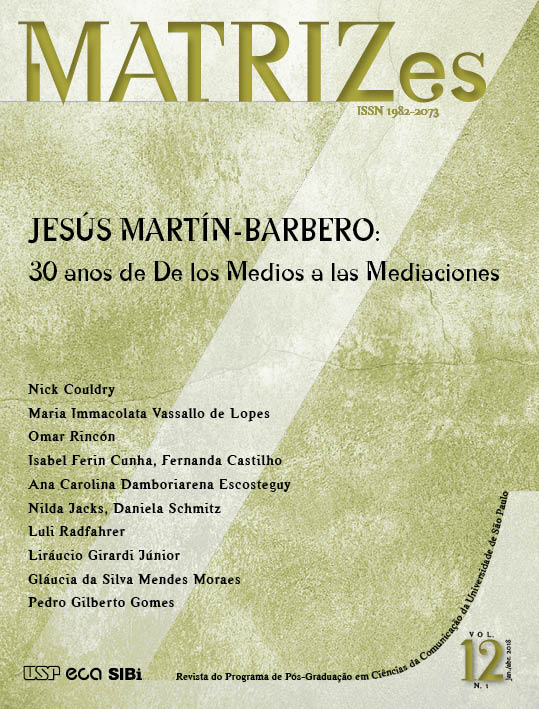O meio é a mediação: uma visão pós-fenomenológica da mediação datacrática
DOI:
https://doi.org/10.11606/issn.1982-8160.v12i1p131-153Palavras-chave:
Pós-fenomenologia, estudos tecnológicos, cultura digital, epistemologia da comunicação, datacraciaResumo
À medida que inovações tecnológicas transformam os processos da comunicação, a Teoria das Mediações de Jesus Martín-Barbero continua a ter importância nos debates epistemológicos a respeito do ambiente da comunicação em redes interativas. Mídias sociais, que, de acordo com a abordagem pós-fenomenológica, são dotadas de intencionalidade e agência moral, tornam-se as mediações preferenciais da comunicação contemporânea, transformando ambientes coletivos em datacracias, regimes em que bases de dados e algoritmos têm grande influência sobre a tomada de decisão. A Teoria das Mediações, ao evidenciar a importância da natureza comunicativa da Cultura, mostra-se essencial na identificação da influência da comunicação na formação ideológica contemporânea.
Downloads
Referências
ASIMOV, I. The caves of steel. New York: Doubleday, 1954.
BENJAMIN, Walter. The work of art in the age of its technological reproducibility and other writings on media. London: Harvard University Press, 2008.
BOGOST, I. The cathedral of computation. The Atlantic, Washington, D.C., 15 jan. 2015. Disponível em: <https://goo.gl/q1snJz>. Acesso em: 27 ago. 2017.
BREY, P. From moral agents to moral factors: the structural ethics approach. In: KROES, P.; VERBEEK, P. (Eds.). The moral status of technical artefacts. Dordrecht: Springer, 2014. p. 125-142.
CANCLINI, N. G. Culturas híbridas. 4. ed. São Paulo: Edusp, 2003.
ECO, U. Obra aberta: forma e indeterminação nas poéticas contemporâneas. São Paulo: Perspectiva, 1979.
GIBSON, W. Neuromancer. New York: Ace Books, 1984.
HABERMAS, J. Knowledge and human interests. Boston: Beacon Press, 1968.
HEIDEGGER, M. The question concerning technology & other essays. New York: Garland, 1977.
INTRONA, L. D. Towards a post-human intra-actional account of sociomaterial agency (and morality). In: JOHNSON, C. The information diet. San Francisco: O’Reilly Media, 2015. p. 31-53.
JASPERS, K. The atom bomb and the future of man. Chicago: University of Chicago Press, 1961.
KELLY, K. What technology wants. New York: Penguin Group, 2010.
KING, S. Under the dome. New York: Scribner, 2009.
KROES, P.; VERBEEK, P. (eds.). The moral status of technical artefacts. Dordrecht: Springer, 2014.
LATOUR, B. Reassembling the social: an introduction to actor-network theory. New York: Oxford Press University, 2005.
LUEPNITZ, D. Schopenhauer’s porcupines: intimacy and its dilemmas: five stories of psychotherapy. New York: Basic Books, 2003.
MANOVICH, L. The algorithms of our lives. The Chronicle of Higher Education, Washington, D.C., 16 dez. 2013. Disponível em: <https://goo.gl/oAvjTK>. Acesso em: 27 ago. 2017.
MARTÍN-BARBERO, J. Dos meios às mediações: comunicação, cultura e hegemonia. Rio de Janeiro: Editora da UFRJ, 1997.
______. As formas mestiças da mídia: entrevista concedida a Mariluce Moura. Revista Pesquisa Fapesp, São Paulo, n. 163, p. 10-15, set. 2009.
MCLUHAN, M. Understanding media: the extensions of man. London: MIT Press, 1994.
MOROZOV, E. To save everything, click here. New York: PublicAffairs, 2013.
MUMFORD, L. Technics and civilization. Chicago: University of Chicago Press, 2010.
PARISER, E. The filter bubble: what the Internet is hiding from you. New York: Penguin Press, 2011.POSTMAN, N. Technopoly: the surrender of culture to technology. New York: Vintage Books, 1993.
RAGON, M. Histoire de la littérature proletarienne en France. Paris: Albin Michel, 1974.
TAYLOR, F. Princípios de administração científica. 8. ed. São Paulo: Atlas, 2010.
VERBEEK, P. Some misunderstandings about the moral significance of technology. In KROES, P., VERBEEK, P. (Eds). The moral status of technical artefacts. Dordrecht: Springer, 2014. p. 75-88.
WEBER, M. The sociology of religion. Boston: Beacon Press, 1971.
ZHAO, J. et al. Men also like shopping: reducing gender bias amplification using corpus-level constraints. In: CONFERENCE ON EMPIRICAL METHODS IN NATURAL LANGUAGE PROCESSING, 2017, Copenhagen. Proceedings... 2017. Disponível em: <https://goo.gl/K3abry>. Acesso em: 28 ago. 2017.
Downloads
Publicado
Edição
Seção
Licença
Autores que publicam nesta revista concordam com os seguintes termos:
- Autores mantêm os direitos autorais e concedem à revista o direito de primeira publicação, com o trabalho simultaneamente licenciado sob a Licença Creative Commons Attribution (CC BY-NC-SA 4.0) que permite o compartilhamento do trabalho com reconhecimento da autoria e publicação inicial nesta revista para fins não comerciais.
- Autores têm autorização para assumir contratos adicionais separadamente, para distribuição não-exclusiva da versão do trabalho publicada nesta revista (ex.: publicar em repositório institucional ou como capítulo de livro), com reconhecimento de autoria e publicação inicial nesta revista.























